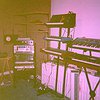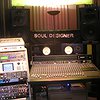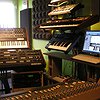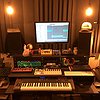How would you describe the relationship between technology and creativity for your work? Using a recent piece as an example, how do you work with your production tools to achieve specific artistic results?
I have a simple way of working usually. If I want to do something soulful and melodic, I'll start with chords. What is fascinating is the way some chords sound depending on the sound you use. So finding a nice chords suite, a bit unique is already difficult. Then, you have to find the sound to magnify those chords the most. To me it’s already a challenge. Then a bass melody to harmonize and give more expression to the chords. So I will work a lot on each of those elements with synths.
I really like the OPXA synth to build sounds. I use it a lot at the moment. I find back sometimes the feeling I had with working with my Elka Synthex. Also, a great combination with great FXs can make the sounds, melodies and chords more intense or beautiful. I use a lot the soundtoys FXs, I can always find some ways to push the sounds and shapes of these further.
Finally the most difficult part of making music is to create something magical by a combination of all those elements. Sometimes changing just a micro element in a “magic“ combination can break it and sounds flat or just ok. That’s why, when I am working on my analog set up, I never turn any machine down till the recording … The digital studio is really convenient to keep the magic easily. That’s the way I worked to compose the chords/bass combo of the “Cinema“ track with Wolfgan Flur.
Within a digital working environment, it is possible to compile huge archives of ideas for later use. Tell me a bit about your strategies of building such an archive and how you put these ideas and sketches to use.
I work with machines and digital tools, but in the end it’s generated by a human … me. What makes it complicated is the fact that I sometimes only have a few hours of deep inspirations in a non-linear way. So having the possibility to record some sketches is a chance to put those on hold. And sometimes I go back to some of these and see if the inspiration is coming. If not, I can try to work on another sketch or just stop and do something outside of the music domain.
The older I get, the more I work in bouts of inspiration. Fortunately, I can feel it inside of me when I’ll be inspired, so that helps. I can’t work on music if I don’t feel it. That's the advantage you have when you have a day job. I don’t have to produce music every day, just when I feel it.
Despite the aforementioned near endless possibilities, many productions seem to follow conventional paths. How do you retain an element of surprise for your own work – are there technologies which are particularly useful in this regard?
I’m not a big fan of those tools helping to compose melodies cause I think it’s the best way to end up with conventional results. As an autodidact musician, I’m supposed to like those tools, but I prefer to take more time to compose something out of the box, with my own sensibility a machine can’t copy.
Something I like in the production process are accidents or random things. It works well with rhythms or monophonic melodies. Like that function on Beatstep pro or some virtual step sequencers, which brings minor random events. It doesn’t change the mood of a bass or composition and merely brings more life into repetitive melodies.
Production tools can already suggest compositional ideas on their own. How much of your music is based on concepts and ideas you had before entering the studio, how much of it is triggered by equipment, software and apps?
I have to say, ideas drive my composition process. Software and equipment are, like I said above, sometimes a possibility to add something extra sound wise but not more than that.
It sometimes happens when I decide to work on a more minimal track based on nothing but a synth line. To do it, I like to use a step sequencer, be it digital or analog, and start with no ideas and turn buttons until I find something interesting. It’s a funny way to work after finishing a really complex track. Minimal tracks are for me a funny break and a more instinctive way of working. I need, and I like both ways to work on a track.
How important is it for you that you personally create or participate in the creation of every element of a piece – from sound synthesis via rhythm programming to mixing?
It is just the fact that I like to work on each part of a track. My favorite one is composing melodies and harmonies as they're the soul of a track. But rhythm programming (I include bass line in this) provides the funky side of the track, and it is really important too. Finally the mixing part is the less exciting for me because it is the one where I have a lack of knowledge. So sometimes when I feel a better mix can really increase the quality of a track, I can mix it with my friend Jean Vanesse (Spirit Catcher) because he knows me and how my sound has to be.
Mixing a track out of my studio can sometimes lose the magic of a track. If you listen to some old Detroit classics like early Kevin Saunderson tracks, it’s far away from the quality of a 2021’s mix. And yet, it has that touch of magic which is the soul of a track. That’s something I sometimes miss in current productions: the sound is super good and powerful, so it works really well, but there is no magic in it. I also asked Andreas Scorpp (he mixed a lot of AME’s tracks) to to do a new mix of “The Track“ previously out on Versatile records for my forthcoming album. I'd mixed the original version myself and was curious to have a new and more professional approach of the mix.
Have there been technologies which have profoundly changed or even questioned the way you make music?
As I've been making music for almost 30 years, hard drives and computer based technologies, sampling and mixing on a PC was a revolution. My first Atari Falcon with a sound recording capacity was a big step to another way to make music. All the new softwares and VSTs are sometimes amazing too, but not as big a step as the one on Atari Falcon in the 90s. Remember the first track I did with it was “Meet U In Brooklyn“, it gave me some nex possibilities of sound layers out of the sampler. (Akai 1100)
To some, the advent of AI and 'intelligent' composing tools offers potential for machines to contribute to the creative provess. Do you feel as though technology can develop a form of creativity itself? Is there possibly a sense of co-authorship between yourself and your tools?
Those technologies can give different perspectives. Like you say, why not a co-authorship with a software. It makes sense if I keep the control of my ideas at the end. As a non musician, I dream of a software able to translate ideas I have in my head into music. It would open a lot of new creative possibilities. I have sometimes ideas I can’t translate exactly how it sounds in my head, that’s really frustrating for me.
We could also use AI to make music based on studies about music therapy. Some frequencies and chords, sounds can help some people to get better, it works for animals too. Some studies on dog exist. So algorithms could build tracks in that way with really precise needs and parameters.
Do you personally see a potential for deeper forms of Artifical Intelligence in your music?
Yeah, like I said, help me to translate music I have in my mind into real music. But it needs a kind of brain interface, so it is even more advanced than just AI … But I’m afraid about AI if the purpose is to help into composing process … The limit between a help and replacing the composer is really thin … I wouldn’t go beyond that limit.
What tools/instruments do you feel could have a deeper impact on creativity but need to still be invented or developed?
So, to follow my previous ideas, a brain interface connected to a software. It would be able to translate melodies, sounds, rhythms from the brain to the software …
But, I suppose it is the dream of a lot of composers. I hope it will exist soon.







